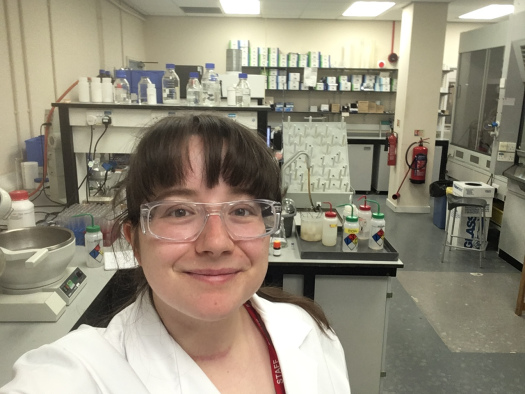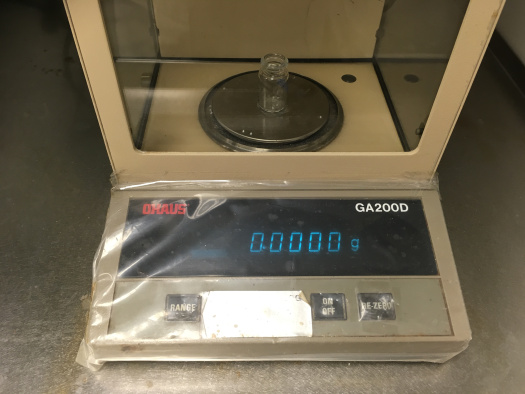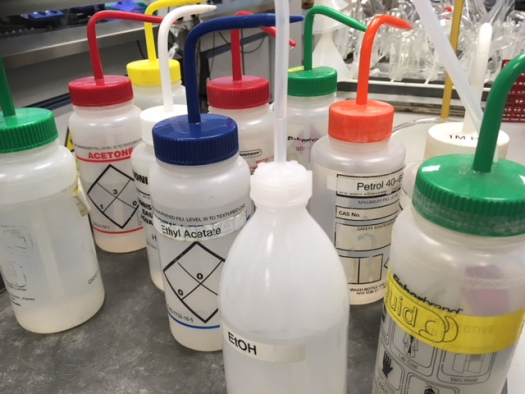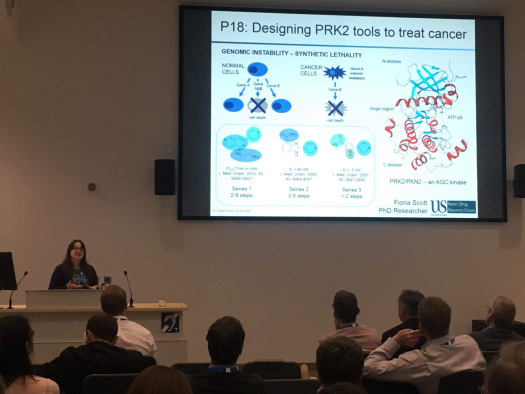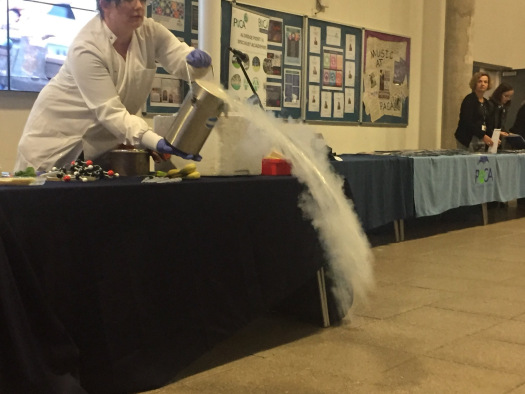A day in the life of chemistry PhD student

I find people’s routines really interesting. Everybody’s different. Some people are early birds while others are night owls. Some people work long hours and others manage to fit a lot of work into a short period of time. In this post, I chat about what a typical day looks like for me and the various things I get involved with both inside and outside of the lab as a PhD student.
Fiona in a lab coat taking a selfie in the chemistry lab.
Day in the life
0630: My alarm goes off. More often than not, I press the snooze button for a little while.
0630-0700: If I’m sufficiently awake, I go for a run; then get ready for uni. I’m currently training for the Brighton Half Marathon at the end of February next year.
0815: Get the bus to campus.
0845-0900: Depending on how the buses are, get into the office, check e-mail and RSS feeds.
MORNING: I spend the morning either at my desk doing data analysis or in the lab running experiments.
1200: I eat lunch with colleagues. I usually bring a packed lunch, but occasionally I treat myself to lunch at one of the university cafes.
AFTERNOON: I usually have a bit of an energy slump after lunch so I switch to low-brain-power tasks e.g. running TLCs in the lab or writing up analyses.
1600: I usually kick back into gear at this time of the day so I will have a burst of activity in the lab or at my desk.
1800-1830: leave office
Evenings: I don’t tend to do work on my PhD when I’m not on campus. In the evenings, I’m either chilling at home, going along to something at my church, or going to review something at the theatre.
***
This is what a typical day, where I have nothing in the calendar, looks like. There are other things that pop up throughout the week which mixes things up. I generally prefer days when I have a meeting or two in the calendar. This is because it makes me more productive with my time – because in my head I’m thinking, “I have to get this done by X because of Y.” Below are some other things that are typical of chemistry PhD life outside of doing experiments:
Cleaning the Lab
A set of super sensitive scales, known as a balance, reading 0.0000 g.
While everyone in my lab has a responsibility for their own lab space, we have a rota for cleaning the communal areas of the lab. This involves checking that our balances don’t have residual chemicals on them; cleaning up the TLC plate area; and checking that our communal rotary evaporator, for removing toxic/smelly substances, has been cleaned.
Solvent Run
In a lab capable of up to nine chemists working in it at once, we get through a lot of chemicals, especially solvents! Solvents are the liquids we run our reactions in. Sometimes it’s water, but it’s usually an organic solvent such as dichloromethane, tetrahydrofuan or an alcohol. We take it in turns to check our communal solvent stocks in the lab and top them up from the school’s central store as needed.
Multiple plastic bottles with different coloured lids containing different solvents.
Supervisor 1-2-1s
About once a week, I sit down with my lab supervisor to review the chemistry and other work I’ve done, troubleshoot any problems I’m having, and I propose what I plan to do next. About once a month, I give a slightly “bigger picture” version of this project update to my main PhD supervisor. This helps me to build up a record of what I do on a weekly/monthly basis and gain input on my project from people with more experience than me.
Teaching
PhD students can undertake casual work at my university to earn extra money. So far I have demonstrated in undergraduate labs – walked around and made sure everyone is carrying out their experiments safely and helped with any issues they had; invigilated exams; marked exam papers and taught tutorials and workshops for undergraduate chemistry/life science courses.
Attend lectures/seminars
As I am undertaking a research postgraduate degree instead of a taught one, I don’t have any mandatory classes as part of my course. That doesn’t mean I can’t take advantage of the learning that’s happening around me on campus. Last year I attended a module called Fundamental Cancer Biology which helped me to consolidate what I’d learned about the biology side of cancer from my own personal reading, which I found very helpful.
The life science school puts on a number of seminars that are mainly geared towards postgraduate students and research staff. While the term “seminar” can mean different things, in Sussex’s School of Life Science, this session is usually an hour-long where an in-house/invited speaker talks for about 45 minutes about their research, followed by questions. It tends to be a very applied talk with only general concepts covered in the first few minutes. I enjoy seminars because you get the chance to learn about all kinds of research outside of your own.
Conferences
A few times a year, I go to conferences. These are 1-3 day events where researchers in academia/industry meet in a specific location to hear talks about research around a specific area. I’ve been to conferences about medicinal chemistry, genome stability, the specific class of drug target I’m working on, and more! There’s a conference for everyone.
Fiona giving a presentation at the RSC Kinase 2018 conference. A single slide summarises my PhD project with diagrams of chemical structures and biological processes.
While I haven’t had the chance to go abroad yet, I’ve been to conferences on my own campus and in Glasgow, Cambridge, and London so far. I sometimes take a poster summarising my research and am now applying to talk at some conferences – now that I’m later on in my PhD. They’re a good opportunity to network and catch-up with people from my field of research.
Public Engagement
It is becoming increasingly common that researchers are required to demonstrate the impact their research has on society by communicating that research to the public. I’ll do a separate post about the various public engagement activities I’ve been involved in another time but very briefly, from time to time, I take part in science fairs, school events at the university, and sometimes go into schools to talk about chemistry.
Fiona pouring liquid nitrogen onto the floor, creating a large fog, as part of a public engagement show about chemistry at a school.
***
Juggling these things requires a lot of time management, which I have varying levels of success at doing. I like that there’s a lot of variety in my work but primarily the goal of my PhD is to spend time in a lab making molecules. The other things give me a change of scene and enable me to develop other skills that will be useful for whatever job I do after my degree.
What does your typical working day look like? Is there an established routine or is every day different? Let me know in the comments below.
Fiona Scott (@fi0n0) is a PhD researcher at Sussex Drug Discovery Centre. This story was published on November 26, 2018 on Fiona’s blog, ‘The Chemistry Of A Phd’ (available here) and has been republished here with her permission.
